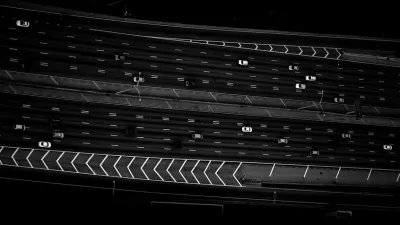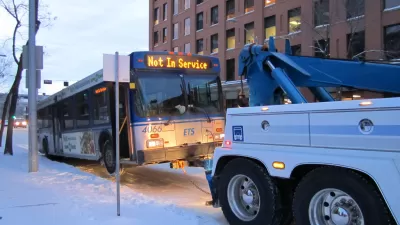Public Transit
Base Your Transit Investment Arguments on Agglomeration
Forget reducing congestion and improving the environment; a new paper makes perhaps the strongest argument yet for investing in public transit based on its ability to agglomerate, or cluster people together, raising wages and productivity.
MTA Studies Millennials to Meet Their Transit Needs
When it comes to meeting the transit needs of millennials, real time information about train arrivals is as important as the transit itself. This is one of the key findings of a New York MTA survey conducted to inform strategies for the future.
How a Private-Sector Approach Can Save Your Transit System
Is your city's transit agency caught in a cycle of rising fares, declining service, and chronic financial problems? Mark Aesch has used an innovative approach to turn around the bus systems in Rochester and Detroit. Could it work in your city?
Proposed Bus Fare Increases Roil Brazil
'Unruly' protests by residents opposed to planned hikes in the cost of bus fares have shaken Sao Paulo and Rio de Janeiro in the past week. The country has a history of transit fare protests going back 130 years.
Slicing the Mobility Pie in Africa's Cities
The research wing of the non-profit think tank Future Cape Town has produced an infographic that provides valuable insight into the mobility patterns found in some of Africa's largest cities. Less sustainable options are growing, raising concerns.
L.A. Plays Catch-Up to Big City Brethren With Debut of Bus-Only Lanes
One of Los Angeles's most congested corridors may have gotten a bit more congested this week - for autos that is - as the first segment of an eventual 12.5 miles of bus only lanes opened along Wilshire Boulevard.

How Miami Lost Its Way to a Transit-Rich Future
Forty years ago, Dade County officials sketched a vision for a paradigm shift away from highways and towards a multi-modal transportation system for the area. Four decades onward, highway expansion is alive and well in Miami-Dade. What happened?
Accounting for Latent Travel Demand
Planners must anticipate how people would respond to new options, such as better walking, cycling and public transit services. This requires imagination.

Are Corporations Imperiling America's Public Transportation Systems?
Chris Hedges warns that corporate consolidation of public transportation is leading to increasingly dangerous conditions for both drivers and passengers, especially in intercity bus systems.
Atlanta Plans for Transit Hub While Ridership Tumbles
Despite falling ridership numbers on the region's public transit system (bucking the nationwide trend), the Georgia Department of Transportation is studying options for building a multi-modal transit hub in downtown Atlanta.
Friday Funny: 26 Reasons Never to Ride Transit Again
Warning: you can't unsee the images gathered as part of BuzzFeed's "26 Things You'll See on Public Transportation", a candid reminder that when is comes to public transit, some things are better left in private.
Free Transit a Big Hit in Estonian Capital
In January of this year, Tallinn (pop. 423,000) became the first European capital and the largest European city to provide public transit free of charge to its residents. So far, the experiment has proven a success.
Minnesota Gov. Unveils Plan to Fast Track Transit Funding
In a budget unveiled last month, Minnesota Gov. Mark Dayton proposed a .25 percent sales tax increase to fund an expansion of the Twin Cities metro area's public transit systems. The proposal has garnered enthusiastic support.
S.F.'s Mayor Sets His Sights on Public Transit
During his first State of the City address, San Francisco Mayor Ed Lee put reforming MUNI - the city's "notoriously late and overcrowded public transit system" - at the top of his agenda.
The Three Keys to Building an Effective Transit Network for L.A.
By comparing the city's density, scale, and distribution of employment nodes to other major cities, Kristin Eberhard makes the case for why and how transit can work in big, dense, polycentric Los Angeles.
Inaccessible Transit Turns NYC Into a Tribulation
In a short film for The New York Times, Jason DaSilva documents how New York's famed public transit system, which serves millions of riders every day, fails the city's disabled residents.
Why Do People Ditch Transit?
Ryan Holeywell discusses a new report from researchers at the University of California, Berkeley that examines the top reasons people stop using public transit. Frequent, consistent service is most important to riders.
Transit Seen as Crucial to Tysons Transformation
The ambitious plan to transform the auto-oriented D.C. suburb of Tysons Corner into vibrant, walkable Tysons will require building a culture of public transportation, and buses are seen a central piece of that effort, reports Luz Lazo.
Rapid Transit Gets Personal, Again
After decades of discussion and experimentation, Personal Rapid Transit (PRT) is again getting attention as a potential alternative means of transport, merging the comfort of the private car with the automation and safety of public transit.
New Map Shows How to Traverse California via Public Transit
For those that dream of traveling the length of the Golden State without getting behind the wheel of an automobile, a new map shows the interconnected system of trains and buses that can get you from San Diego to Eureka and in-between.
Pagination
Urban Design for Planners 1: Software Tools
This six-course series explores essential urban design concepts using open source software and equips planners with the tools they need to participate fully in the urban design process.
Planning for Universal Design
Learn the tools for implementing Universal Design in planning regulations.
Heyer Gruel & Associates PA
JM Goldson LLC
Custer County Colorado
City of Camden Redevelopment Agency
City of Astoria
Transportation Research & Education Center (TREC) at Portland State University
Jefferson Parish Government
Camden Redevelopment Agency
City of Claremont


































